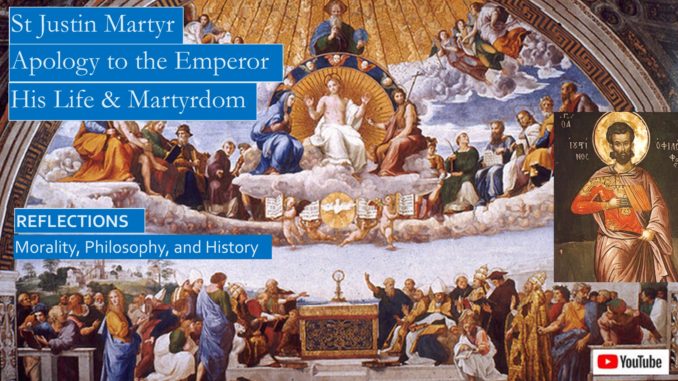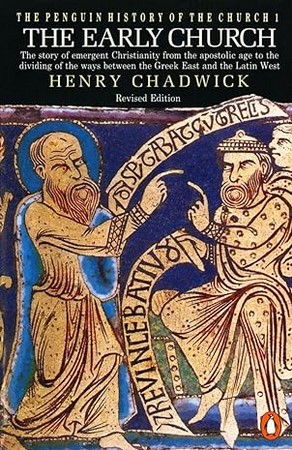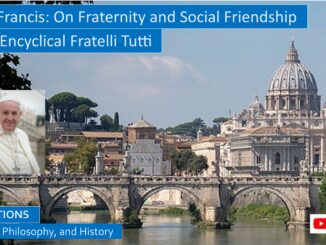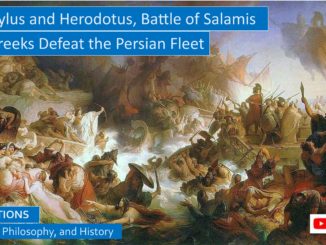
The writings of St Justin the Martyr were highly esteemed in the early Church. His writings are mostly apologetic with little of the moral teachings that seem like a breath of fresh air to modern Christians. His many pages repeat the observations we have heard so many times before, but what makes them special is often he is one of the first to make these observations.
St Justin saw himself as a philosopher, a Christian philosopher, for he believes that the Christian faith is much superior to the Stoic, Aristotelean, and Platonic philosophies he was schooled in before he became a Christian. His writings are apologetic, which means he is much more eager to show the superiority of Christianity over the pagan philosophy, and not so eager to show how studying this pagan philosophy can help us to become better Christians, although he is not as hostile towards philosophy as Tertullian, who famously asked, “What has Athens to do with Jerusalem?”
Henry Chadwick puts it this way in his history, The Early Church: “Much of the Platonic tradition is warmly accepted by Justin: Plato rightly taught that the soul has a special kinship to God, that man is responsible for his actions, and that in the world to come there is judgement and justice. Justin thinks Plato made some mistakes, for example what he holds that the soul possesses a natural and inherent immortality in its own right rather than in dependence on the Creator’s will, and in accepting the deterministic myth of transmigration of souls,” or reincarnation. He thought Plato and other philosophers “had before them the mysterious allegories of the Pentateuch (Genesis through Deuteronomy), which provided them obscure hints of the truth.” Like St Paul, Justin believed in the “validity of the universal moral conscience, quite independent of any special revelation (Romans 1-2).[1]
After he converted to Christianity Justin moved to Rome where he composed what is thought to be his earliest extant work, his First Apology addressed to Emperor Pius. During the reign of Emperor Marcus Aurelius he debated the cynic philosopher Crescens, who turned him into the authorities. “Rusticus the prefect said to Justin, ‘Obey the gods at once, and submit to the emperors.’ Justin answered, ‘To obey the commandments of Jesus Christ is worthy neither of blame nor of condemnation.’ “ St Justin Martyr was beheaded.[2]
FIRST APOLOGY ADDRESSED TO THE EMPEROR
Justin opens his apology, “Reason directs those who are truly pious and philosophical to honor and love only what is true, declining to follow the opinions of the ancients if these be worthless,” a surprising argument, given the weight that the Romans placed on the ancient traditions. Right belief matters, “the lover of truth should choose to do and say what is right, by all means, and if threatened with death,” be willing to lay down his own life.
Justin quotes Plato, “unless both the rulers and the ruled philosophize, it is impossible to make states blessed.” The ancients believed that to pursue philosophy was to seek to live a godly life. Justin also echoes Plato when he says “rulers should rule in obedience, not to violence and tyranny, but to piety and philosophy,” a somewhat ironic wish since under the rule of the philosopher emperor Marcus Aurelius he would suffer a martyr’s death.[3]
The Christians were charged with atheism, for in the ancient world atheists were those who did not believe in Zeus and Hera and the other gods on Mount Olympus and all around us. Rarely did the early Church Fathers argue that these gods did not exist, but rather argued as did St Justin Martyr that these gods were actually demons who appeared as apparitions of the ancient gods to defile women and corrupt boys, striking terror in the hearts of men. “When Socrates endeavored by true reason . . . to deliver men from the demons,” then the demons plotted to bring about his death on the charge of introducing new divinities.[4]
There was a double standard favoring pagan men in ancient Greece and Rome, they were not expected to be chaste. This would change with the early Christians, their major evangelical message was to repent, be baptized, and sin no longer. Early in the apology Justin quotes Scripture from memory, “whoever looks upon a woman with lust in his heart has committed adultery with her in his heart before God.” And, “if your right eye offends, cut it out; for it is better to enter into the kingdom with one eye, than to be cast into everlasting fire with two eyes.” Christ is sent to save sinners, “Christ calls not the just nor the chaste to repentance, but the ungodly, the licentious, and the unjust,” for the heavenly Father desires to forgive those who repent, He does not seek to punish the guilty.
This sounds weak to those living in a warrior society, “if you love them who love you, what good is this? Even fornicators do this. But I say unto you, pray for your enemies, and love them that hate you, and bless them that spitefully use you.”[5]
“The greatest command is, You shall worship the Lord thy God, and Him only you shall serve, with all your heart, and with all your strength, the Lord God that made thee.”[6]
The Christian belief in the resurrection of the dead was a stumbling block for Marcus Aurelius in his Meditations and for many Greeks. Justin argues that just as men can be produced from a small drop in the womb, so the bodies of men “after they have been dissolved, and like seeds planted in the earth, can in God’s appointed time rise again and put on incorruptible bodies.” As Christ said, “what is impossible with men is possible with God.”[7]
Justin quotes many familiar verses predicting Christ, such as Isaiah predicting the virgin birth of Jesus and the prophecies of the events of the Crucifixion in Psalm 22. Justin has many beautiful chapters on Isaiah, we encourage you to discover them for yourself. We will comment on the interesting and lesser known prophecies, at least to modern Christians.
Justin sees in Jacob’s deathbed blessing of his son Judah a prophecy of the coming of Christ:
The scepter shall not depart from Judah,
nor the ruler’s staff from between his feet,
until tribute comes to him;
and the obedience of the peoples is his.
Binding his foal to the vine
and his donkey’s colt to the choice vine,
he washes his garments in wine
and his robe in the blood of grapes.[8]
The scepter is the foretold coming of Christ the lawgiver, who will ride a foal into Jerusalem before Passover, and “washing His robe in the blood of the grape predicts the Passion He would endure, cleaning by His blood those who believe on Him.”[9]
The early Church Fathers teach that whenever the Deity speaks in the OId Testament, that it is Christ, the Logos, the Word of God who speaks as God. Early examples of this belief we see in St Justin, who tells us that “when Moses was ordered to go down into Egypt and lead out the people of the Israelites, while he was tending the flocks of Jethro, his maternal uncle, in the land of Arabia, our Christ conversed with him under the appearance of fire from a bush, and said, “Take off your shoes, and come close to hear.” “He received mighty power from Christ, who spoke to him in the appearance of fire, and went down and led out the people, having done great and marvelous acts.”[10]
Justin includes one of the earliest descriptions of baptism and the eucharist. When new Christians come to “believes that what we teach and say is true, and undertake to live accordingly, they are instructed to pray and to entreat God with fasting, for the remission of their past sins, we praying and fasting with them” in preparation for the baptism in the name of the Father, Son, and Holy Spirit. The washing away of sins in baptism is called illumination, because those who learn the truth “are illuminated in their understandings.”[11] This passage is referenced in the Catholic Catechism, CCC 1216.
Only those who have been baptized can partake of the Eucharist, “the flesh and blood of that Jesus who was made flesh.”[12] After the bread and wine is distributed a collection is taken up: “The well-to-do, and willing, give what each thinks fit; and what is collected is deposited with the presiding elder, who takes care of the orphans and widows and the sick and needy and imprisoned and strangers among us.”[13] These passages are referenced in the Catholic Catechism, CCC 1351 and 1355.
Appended to his First Apology is an Epistle of Marcus Aurelius to the Roman Senate where the emperor relates a miracle on a campaign where the Roman army found itself in desperate straits in their campaigns against the German barbarians threating the borders of the empire. The emperor prayed to the pagan gods for deliverance, and when he learned that many of his soldiers were Christians he asked that they pray to their God as well. This epistle tells us of these Christians, how they “began the battle, not by preparing weapons, nor arms, nor bugles; for such preparation is hateful for them, on account of the God they bear about in their conscience.”
Even after the emperors became Christian emperors after Constantine, the early Church always viewed military service as a necessary evil, the early Church always viewed bloodshed as abhorrent, and required that all soldiers who shed blood in battle would need to undergo many years of penance before they were allowed to partake of the Eucharist, a practice that is not followed today, and which enables us to make sense of this comment in the Epistle.
The Epistle continues, immediately when the Christians “cast themselves on the ground to pray to their God, water poured from, refreshingly cool water, but on their enemies fell a fiery withering hail. And immediately we recognized the presence of God following this prayer, a God unconquerable and indestructible.”
Even the Protestant scholar compiling this work in the late 1800’s footnotes this Epistle as “spurious, no doubt, but the literature of the subject is very rich.” [14] Modern scholars no doubt agree. What this appended Epistle does tell us is that many early Christians wanted to believe that this Epistle from Marcus Aurelius was authentic, which is all the more remarkable since his writings, the Meditations, was largely unknown in the ancient world. In my blog on Marcus Aurelius we discuss whether he was an active persecutor of Christians. Perhaps he wasn’t.
St Justin Martyr Blog 2 http://www.seekingvirtueandwisdom.com/justin-martyr-second-apology-and-socrates/
[1] Chadwick, “Early Church History,” chapter on Justin and Irenaeus, pp. 75-76
[2] The Martyrdom of the Holy Martyrs, In the Ante-Nicene Fathers, Volume 2, translated by Rev M Dobs (Boston: Hendrickson Publishers, 1994, first published 1885), pp. 305-306.
[3] St Justin Martyr, “The First Apology of Justin,” In the Ante-Nicene Fathers, Volume 2, translated by Alexander Roberts and James Donaldson, Chapter II, p. 163.
[4] St Justin Martyr, “The First Apology of Justin,” Chapter V, p. 164.
[5] St Justin Martyr, “The First Apology of Justin,” Chapter XV, pp. 167-168.
[6] St Justin Martyr, “The First Apology of Justin,” Chapter XV, p. 168.
[7] St Justin Martyr, “The First Apology of Justin,” Chapter XIX, p. 169.
[8] https://www.biblegateway.com/passage/?search=genesis+49%3A10-11&version=NRSVCE
[9] St Justin Martyr, “The First Apology of Justin,” Chapter XXXII, p. 173.
[10] St Justin Martyr, “The First Apology of Justin,” Chapter LXII-LXIII, p. 184.
[11] St Justin Martyr, “The First Apology of Justin,” Chapter LXI, p. 183.
[12] St Justin Martyr, “The First Apology of Justin,” Chapter LXVI, p. 185.
[13] St Justin Martyr, “The First Apology of Justin,” Chapter LXVII, p. 186.
[14] St Justin Martyr, “Epistle of Marcus Aurelius to the Senate, appended to “The First Apology of Justin,” p. 187.





5 Trackbacks / Pingbacks